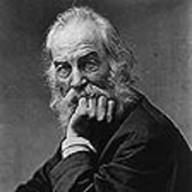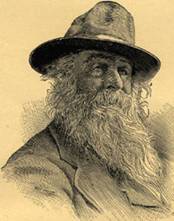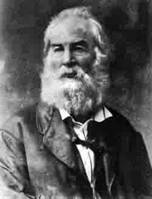LITR 5535: American
Romanticism

Student Poetry Presentation 2006
Monday 6 November:
poetry: Whitman, “When I Heard the Learn’d Astronomer,” N 1070
poetry
reader / discussion leader: Marion
Carpenter



Walt Whitman
Born: West
Hills,
Died:
Walt Whitman – “When I Heard the Learn’d Astronomer” (p.1070)
When I heard the learn’d astronomer,
When the proofs, the figures, were ranged in columns before me,
When I was shown the charts and diagrams, to add, divide, and measure them,
When I sitting heard the learn’d astronomer where he lectured with much applause in the lecture-room,
How soon unaccountable I became tired and sick,
Till rising and gliding out I wander’d off by myself,
In the mystical moist night-air, and from time to time,
Look’d up in perfect silence at the stars.
1865
While it wasn’t part of our reading, I feel I will have failed to capture the Romantic Spirit of our course if I don’t say something about Whitman’s “Song of Myself” (1881) (previously published in 1855 as “Leaves of Grass”) which was left off the syllabus, most likely, due to the length of the work (p. 1003-1047). I’d like to take a moment to explain why I consider this a loss though, as it also lends to my discussion of today’s poem.
“Song of Myself” is one of the first experiments with free verse poetry in America, there is no rhyme scheme, is a varying metrical rhythm, and the foot measures are not uniform. It is filled with long catalogues of imagery and sensory embellishments and raises the reader to a heightened level of perception through Walt Whitman’s various senses. It is a journey around the world, through time, even into space, and it consumes everything into itself, packing infinity into a collection of pages for the reader to enjoy. It contains the basest of desires, the greatest of losses, pleasure, and pain; it strives at the verge of sublimity and finally collapses on itself, exhausted from the struggle. It is proof of American Romanticism moving into a Modern age.
Today’s poem is similar on some levels, though much more compact at eight lines long. It is also free verse; the lines have no rhyme scheme, foot measures are not uniform, and the meter is varied throughout. Unlike “Leaves” though, which has moments of building and moments of lollygagging about, there is a hurriedness to the poem that makes you want to rush through it, like an impatient child it keeps prodding us, “When, when, when, when, how soon” before we reach the meat of the speaker’s intentions and then everything grinds to a slow realization of absolute wonder.
Whitman uses short catalogues, but nothing as robust as in “Leaves.” His choice of vocabulary is absolute and purposeful, no word is wasted. Proofs, figures, columns, charts, diagrams, add, divide, and measure are all very confining words in their uses within this work; they force the stars to submit to science and mathematics. The speaker doesn’t just walk, he glides, he wanders, into the night—again, not just any night, but a spiritual dewiness. Ultimately he does not confine beauty behind a formula and instead delights in the night’s reverence.
Questions:
1. What, besides the era in which it was written, do you find makes “Astronomer” a Romantic poem?
2. In what ways is the feel of this poem American?
My notes:
1. the imbalance toward the natural beauty over the constrictive scientific truths, speaker glides, sensate qualities throughout, comparative discussion of truths, mathematic/scientific truth vs. spiritual/mystical/natural truths.
2. the form is American, the free verse, refusal to conform to a standard form, spirit of free will, speaker doesn’t let the astronomer speak for him, doesn’t accept truths presented just because they are science and provable, makes up own mind on the subject, makes choice to delight in the night without submitting to the mindset of the astronomer, provides both sides with representation.
|
|
|
|

